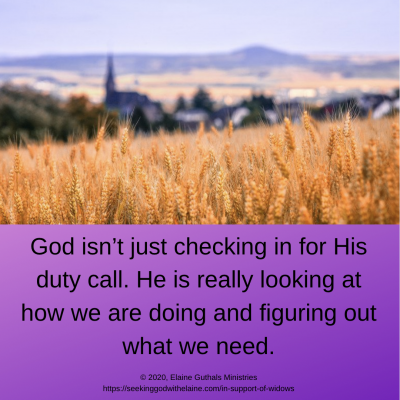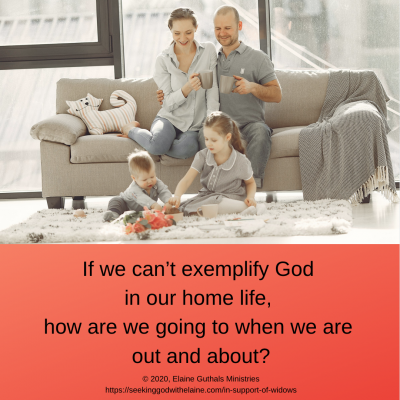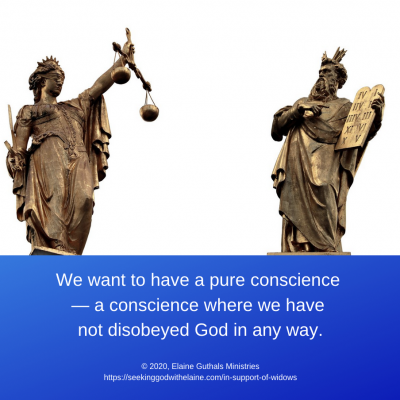Families have a multi-generational component to them. James and Paul discussed how children – and the church – are to support widows. This devotion looks at how God see supporting widows as an indication of faith.
Nuggets
- It is intended that disciples provide charity to widows when needed.
- Paul qualified that families should be the first support for the widows.
- If we can’t love and support our family, how can we love God?
In Support of Widows
Instructing Our Children
Who Is the Greatest in the Kingdom of Heaven?

Society used to be a patriarchal society. Women were restricted to roles within the home and family.
Jesus, however, elevated women to be equals. No, He didn’t revamp societal structure. He did include them in His kingdom and in His ministry.
Women still had problems when they became widows. Their financial support and protections were generally gone.
Peloni explained their hardships. He wrote, “Among the Jews, as among most Oriental races of the ancient world, widows and orphans were of all classes the most liable to plunder and oppression. Their inheritance was often filched from them under forms of law, now that they bad (sic) no strong arm to protect them, by an unjust judge whom they were unable to bribe, or even forcibly wrested from them by some rapacious kinsman or neighbour.”
This wasn’t what God intended. “You shall not mistreat any widow or fatherless child. If you do mistreat them, and they cry out to me, I will surely hear their cry, and my wrath will burn, and I will kill you with the sword, and your wives shall become widows and your children fatherless” (Ex. 22: 22-24 ESV).
But how is that supposed to play out? There are some passages in the New Testament that help shed some light on what is intended.
Let's Put It into Context
Family is, according to the Holman Bible Dictionary, “the basic household unit which provides a person’s central relationships, nurture, and support.”
Resource
Ordinances are an expression of the disciples’ obedience. Marriage is an ordinance.
Visit the Widows
“Religion that is pure and undefiled before God, the Father, is this: to visit orphans and widows in their affliction, and to keep oneself unstained from the world” (Jas. 1: 27 ESV)
It is intended that disciples provide charity to widows when needed. Charity means showing others love flavored with acts of benevolence. Butler described that as “in any want or distress wherein they need and are capable of our assistance.” That shows others the loving character of God.
James was well aware that there are destitute and afflicted of every class. His intended recipients, though, are those described as those who need the help the most. He was describing those who are ill or elderly who truly in a dire situation.
Resource
We want to make sure we use the right definition of want. James is not talking about what is desired. It is the needy and destitute definition that he is talking about here.
We also have to look at what is meant by the word visit. It doesn’t mean go, play a game or two of pinochle, catch up on what is going on in everyone’s lives, and go back home.
That isn’t how God visits us — and God does visit us. “You visit the earth and water it; you greatly enrich it; the river of God is full of water; you provide their grain, for so you have prepared it” (Ps. 65: 9 ESV).
God isn’t just checking in for His duty call. He is really looking at how we are doing and figuring out what we need. Then, He goes about providing that and improve our circumstances.

Family Provides First
“Support widows who are genuinely in need. But if any widow has children or grandchildren, let them learn to practice godliness toward their own family first and to repay their parents, for this pleases God. The widow who is truly in need and left all alone has put her hope in God and continues night and day in her petitions and prayers” (I Tim. 5: 3-5 CSB)
Paul qualified who should be the first support for the widows. He instructed the families to take care of the women within their family who have found themselves widowed.
Rowland noted that “the idea is that we owe a debt of gratitude to those from whom we have derived existence, and to whom we owe the support, care, and education we have received. We are bound to see that to the utmost of our ability their wants in old age are met.” Mom and Dad took care of my sister and me when we were growing up. We took care of them when they were growing old.
Resource
What Paul was getting at here was each family member has rights. We must respect those rights, especially when their situations change. Mothers didn’t lose their rights when fathers died.
Our character as disciples must first be evident in the home. Macgregor reminds us that “Our tenderest relations, our strongest affections, our highest joys, our deepest sorrows, all are touched by the thought of home.”
Resource
Of course, our character is most tested at home. That is generally where we let our guard down. Plus, our family members know us the best, so can sometimes hurt us the worst.
We still have family responsibilities. That shows how our character is imitating God’s character. If we can’t exemplify God in our home life, how are we going to when we are out and about?

No Support, No Faith
“Command this also, so that they will be above reproach. But if anyone does not provide for his own family, especially for his own household, he has denied the faith and is worse than an unbeliever” (I Tim. 3: 7-8 CSB)
Paul doesn’t pull any punches, does he? He just lays it out there in plain sight.
But really, this is what James was saying. “Religion that is pure and undefiled before God, the Father, is this: to visit orphans and widows in their affliction, and to keep oneself unstained from the world” (Jas. 1: 27 ESV).
If we can’t love and support our family, how can we love God? How can we be true disciples?
How do we deny the faith? Faith is the belief that the doctrines stated in God’s Word are true, even if we do not understand all aspects of them.
If we don’t love and support our family, we are saying that the God’s doctrines aren’t true. His love is not true. The Trinity is not true, because that is about family.
Paul said it again. “But if anyone does not provide for his own family, especially for his own household, he has denied the faith and is worse than an unbeliever” (I Tim. 5: 8 CSB).
We not only have to believe that God’s doctrines are true, but we also have to believe that He holds us accountable for implementing them. We have to believe that they are supposed to impact our character and influence our daily lives.
We want to have a pure conscience — a conscience where we have not disobeyed God in any way. We want to work toward obeying Him completely.

Don’t Burden the Church
“If any believing woman has widows in her family, let her help them. Let the church not be burdened, so that it can help widows in genuine need” (I Tim. 5: 16 CSB)
At first glance it may seem cold that Paul would say to not burden the church with widow care. I can think of a couple of reasons he may have said that — beyond it being the duty of the family.
Paul may see it as a way of keeping the family unit in tact. The widows won’t have to give up that to which they have been accustomed. The younger women have the opportunity to thank the widows for all the love and care that they have provided them over the years.
Church resources can be limited at times. If the family is able to meet the widow’s needs, that does leave those resources free for someone else who may need the help more — like those who have no remaining family.
I can see Paul not wanting to take the focus off of the spiritual needs. We can’t take our eyes off God to focus on this world. We have to focus on Him.
Making the Connections
Tied with the charity is mercy. Disciples’ mercy is a characteristic of compassion for the needs of others, especially those who are in distress. In this way, we show God’s mercy. God’s mercy is the unexpected way God responds in love to our needs.
If we as disciples say God’s ways are higher than the worldview ways (Isa. 55: 8-9), then we must interact within our families in a higher way than the world interacts with theirs. To do less would be an insult to Christ.
Making the Connections to Self-Discipline
We’ve been looking at defending our beliefs when we are witnessing. That means we have to be secure enough to convince someone to accept our beliefs.
Our questions should still serve us to determine on what we need to focus.
- What does the Scriptures say?
- What do I believe?
- Why do I believe the same/differently than the Scriptures?
- What are the talking points when witnessing to a non-believer?
Related Links
I have created a worksheet of the questions above. Click on the button below to access it.
How Do We Apply This?
Somewhere in my reading, I read that we are expected to do the unexpected. We could take that a couple of ways.
It could mean that what we do to support the widows is supposed to mean something. It is not just a duty.
It is a service. Service is an act based on belief in God that comes from a response of worship by acknowledging His power through our submission.
It could also mean that our service is supposed to be over and beyond what is expected. That ties in with the unexpected ways God responds in love.
How do we deal with multi-generational issues? With patience.
I got such a charge out of what Talmage said. He wrote, “Prayers in the household will not make up for everything.”
Resource
We can’t just pray for God to take care of our widows. We have to be God’s hands and feet and do it.
We can’t just pray for a cohesive family. We have to work to make it so.
God has given us families to love, support, and instruct us. We are families through the good times and bad, through the beginning of life and ending of life. We need to follow God’s way through it all.
Father God. You have given us family. May we love them and support them in the way they need. May this especially be true when circumstances change and our family members find themselves widows. May we show them Your love and provision. Amen.
What do you think?
Leave me a comment below (about this or anything else) or head over to my Facebook group for some interactive discussion.
If you don’t understand something and would like further clarification, please contact me.
If you have not signed up for the email daily or weekly providing the link to the devotions and the newsletter, do so below.
If God has used this devotion to speak with you, consider sharing it on social media.
Pingback: Who Is the Greatest in the Kingdom of Heaven? – Seeking God with Elaine